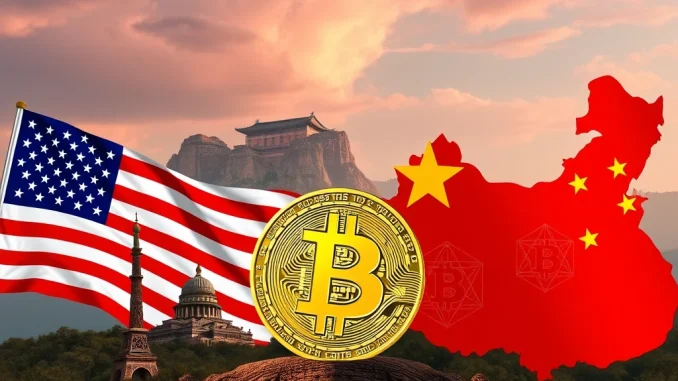
A recent statement from former President Donald Trump has ignited discussion in the cryptocurrency world. According to a report by Walter Bloomberg on X, Trump asserted that the US crypto leadership position is currently ahead of China’s. This claim touches upon the ongoing technological and economic competition between the two global powers, extending now into the realm of digital assets.
What Did Donald Trump Say About Crypto?
The specific statement, as reported, was a direct claim that the United States holds a leading position over China in the cryptocurrency sector. While brief, this comment from Donald Trump crypto perspective is significant, given his previous skepticism towards digital currencies like Bitcoin. His acknowledgement, let alone a claim of leadership, signals a potential shift in tone or at least an awareness of the strategic importance of this technology.
Why Does US Crypto Leadership Matter?
The idea of leadership in the crypto space is multifaceted. It can refer to technological innovation, market size, regulatory clarity, adoption rates, or even geopolitical influence. Claiming US crypto leadership suggests the US is excelling in one or more of these areas compared to China. This is crucial because control or influence over future financial technologies could have significant economic and strategic advantages on the global stage.
Consider these aspects:
- Innovation Hub: Leading in crypto can mean being at the forefront of blockchain development, DeFi (Decentralized Finance), NFTs (Non-Fungible Tokens), and other related technologies.
- Market Dominance: It could relate to the volume of trading, the number of crypto companies, or the amount of capital invested within the country.
- Regulatory Framework: A clear and favorable regulatory environment can attract businesses and talent, fostering growth.
- Global Standards: Leading nations often play a larger role in setting international standards for new technologies.
Comparing the US and China Crypto Landscapes
To understand Trump’s claim, it helps to look at the different paths the US and China have taken regarding crypto.
China’s Approach:
China has historically taken a restrictive stance towards decentralized cryptocurrencies like Bitcoin. Key actions include:
- Massive crackdown on crypto mining operations.
- Banning cryptocurrency exchanges and trading within the country.
- Focusing heavily on its own central bank digital currency (CBDC), the digital yuan (e-CNY).
This approach aims to maintain tight control over financial flows and build a digital currency infrastructure managed by the state. While suppressing decentralized crypto, China is a leader in CBDC development and adoption.
The US Approach:
The US landscape is characterized by a more complex and, at times, uncertain approach:
- Significant private sector innovation in blockchain and crypto.
- Large market capitalization and trading volume.
- Regulatory oversight is fragmented across multiple agencies (SEC, CFTC, Treasury), leading to a lack of clear, unified cryptocurrency regulation.
- Debate around a potential US CBDC, but no immediate plans for widespread rollout like China.
The US benefits from a culture of innovation and strong capital markets, but faces challenges with regulatory clarity that can hinder growth for some businesses.
What Does “Leading” Mean in the Geopolitics of Crypto?
The intersection of crypto and international relations highlights the growing field of geopolitics crypto. A nation’s stance and progress in digital assets can impact its financial power, technological independence, and influence on the global financial system. Trump’s claim frames crypto not just as a financial or tech trend, but as an area of strategic competition akin to AI or 5G technology.
Perhaps the claim of leadership refers to:
- The strength and resilience of the US private crypto sector despite regulatory hurdles.
- The potential for US innovation to shape the future of decentralized finance globally.
- A perceived advantage in attracting global crypto talent and investment compared to China’s restrictive environment.
Challenges and Opportunities for US Crypto
Despite claims of leadership, the US crypto sector faces challenges:
Challenges:
The lack of a comprehensive and clear cryptocurrency regulation framework remains a significant hurdle. Businesses often struggle with compliance and legal uncertainty, sometimes leading them to look at jurisdictions outside the US. Consumer protection and market integrity also require robust regulatory attention.
Opportunities:
The US has a strong foundation of technological expertise, venture capital, and a large, active market. Clearer regulation could unlock further investment and innovation, potentially solidifying any claimed lead and fostering responsible growth in the sector.
The Future of US-China Crypto Competition
The competition between the US and China in the digital asset space is likely to continue. China’s focus on a state-controlled digital currency and suppression of decentralized alternatives contrasts sharply with the US’s more market-driven, albeit less regulated, approach to decentralized crypto. How this dynamic plays out will shape the future of finance and technology globally.
Whether the US truly leads China in crypto depends on the metrics used. China leads in CBDC implementation, while the US leads in decentralized crypto innovation and market size. Trump’s statement, however, puts the concept of US crypto leadership firmly on the table as a point of national pride and strategic importance.
Conclusion: A Bold Claim in the Digital Race
Donald Trump’s assertion that the US leads China in the cryptocurrency sector is a notable statement, especially given the complex and differing paths the two nations have taken in the digital asset space. It highlights the growing recognition of crypto’s strategic importance in the global technological and economic race. While the specifics of what constitutes ‘leadership’ are debatable and the US faces its own challenges, particularly in clear cryptocurrency regulation, the claim itself underscores the high stakes involved in the future of digital finance and the ongoing geopolitics crypto narrative between global powers.



